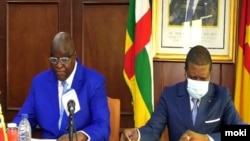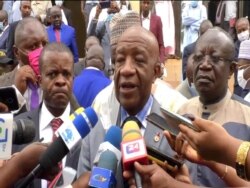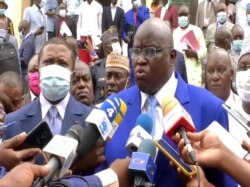Cameroonian truck drivers have accused security escorts in the troubled Central African Republic (CAR) this week of abandoning the convoys when they were attacked by rebels. The drivers say hundreds of trucks are stuck in Cameroon until C.A.R. and U.N. authorities can better guarantee their safety.
Drivers say hundreds of trucks are stranded in the eastern town of Garoua Boulay, on the border with the Central African Republic, unable to deliver needed goods due to poor security.
Troops from the C.A.R. and the U.N.'s Multidimensional Integrated Stabilization Mission, MINUSCA, have been providing security escorts for the convoys.
But the head of Cameroon's Land Freight Transportation Bureau, El Hadj Oumarou, says this week there have been four rebel attacks on convoys traveling to the C.A.R. capital, Bangui.
Oumarou says all strategies put in place to protect trucks, truck drivers, and goods on C.A.R. territory should be reviewed," said Oumarou. "He says just this week some (escort) troops fled heavy shooting from C.A.R. rebels and abandoned drivers and their trucks between Garoua Boulaye and Bangui. Oumarou says some of the drivers were wounded, some goods diverted, and all trucks went back to Cameroon.
Idrissou Manga, an official with the Cameroon Truck Drivers Union in Garoua Boulaye, said nine drivers received minor injuries.
He said more than 900 trucks stationed in Garoua Boulaye are refusing to transport humanitarian aid to Bangui until the security situation is improved.
Manga spoke from Garoua Boulay via a messaging app.
He says his trade union is for Cameroonian drivers. But, because of the hardship in Garoua Boulaye, Manga says they have decided to extend a hand of fellowship to drivers from the Central African Republic and Chad. He says the union gives the truckers food, water and toiletries.
The C.A.R. minister of Transport and Civil Aviation, Arnaud Djoubaye-Abazene, visited Cameroon this week to assess the transport situation.
After meeting Monday with Cameroon’s transport minister, Jean Ernest Messina Ngale Bibehe, he denied C.A.R. or UN troops had abandoned the convoys.
But he admitted it was possible there were what he called “tactical withdrawals.”
Abazene says President Faustin-Archange Touadera has taken appropriate measures to stop the rebels, who are contesting his victory in the December 27 election, from creating havoc in the C.A.R.," Abazene said. "He says with the support of C.A.R. partners like Russia, Rwanda, and UN troops, many rebels have been neutralized. Abazene says security has been assured in most C.A.R. towns but there are still some pockets of resistance that the forces will handle. He says drivers should trust the C.A.R. government.
Abazane said in spite of the fresh attacks, a convoy of humanitarian and commercial supplies from Cameroon had reached Bangui this week.
He assured Cameroon’s truckers that adequate security measures have been taken.
A spokesperson for the U.N. peacekeeping mission did not respond to a request for comment. But, in a press release this week MINUSCA acknowledged some challenges to escorting the drivers.
The U.N. this week said the volatile security situation in the C.A.R. was hampering aid deliveries and causing a steady rise in the price of staple foods since December.
The U.N.’s refugee agency (UNHCR) says by February 16, about 110,000 Central Africans had fled the violence that erupted from the December 27 elections.
The UNHCR says 6,100 C.A.R. civilians fled to Cameroon, 7,400 to Chad, 4,300 to Congo, and 92,000 to the Democratic Republic of Congo.
The C.A.R. accuses former president Francois Bozize, whose candidacy for the presidential election was rejected, of attempting a coup.
He denies organizing December rebel attacks, which were repelled by U.N. troops.







